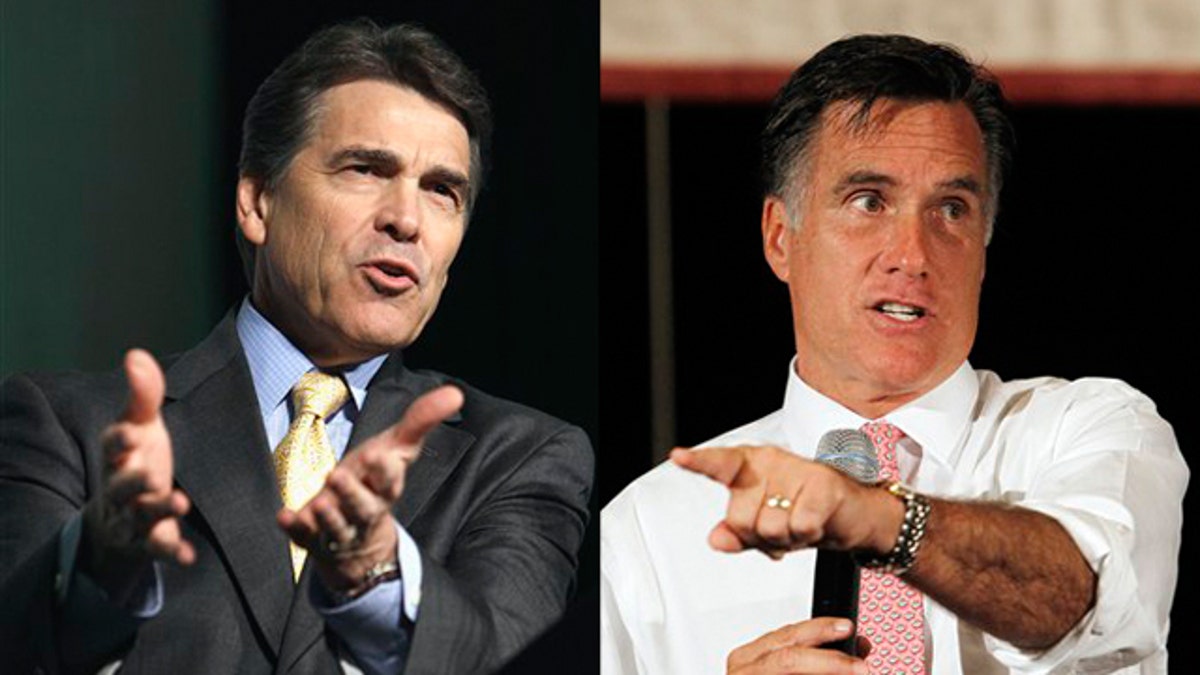
Shown here are Texas Gov. Rick Perry, left, and former Massachusetts Gov. Mitt Romney. (AP)
When the Republican presidential candidates take the stage Thursday for the Fox News/Google debate, the field viewers see could be the field they get.
Time is just about up for late entries into the 2012 race.
Despite the chatter from GOP analysts uneasy with the lineup, the sideline-sitters appear to backing away more and more from the prospect of running. And given the rancor that's characterized the primary battle to date, voters might not see any new faces on the campaign trail until the eventual nominee chooses a running mate.
And don't expect that eventual running mate to be a runner-up from the current field, analysts say, as the nominee will likely look elsewhere for a No. 2.
"There are very, very attractive candidates who are not running for president," GOP pollster Adam Geller said, and those individuals will probably be considered as running mates.
Noting the hardship involved with launching a full-fledged campaign at this point, Geller said GOP luminaries who thus far have brushed off calls to run at the top of the ticket will continue to do just that.
"It takes an enormous amount of organization, an enormous effort to raise money, to work in each of the early states to build a team," he said. "The first caucuses and primaries are now just a few months away. ... It is just hard to imagine that someone new will come in the field."
On one hand, Texas Gov. Rick Perry proved with his August entrance and subsequent surge in the polls that a late-filing campaign can prosper. Prominent conservatives suggested over the weekend that it's not too late for someone like New Jersey Gov. Chris Christie to follow the same route.
But Perry was also plotting for that move well in advance. While he missed the famed Ames Straw Poll in Iowa, he made his candidacy announcement the very same day, in South Carolina, and then scooted his budding operation over to Iowa for meet-and-greets.
Perry also gave the race something it was missing -- a red-state, folksy alternative to New England businessman and former Massachusetts Gov. Mitt Romney, whose closest competitor before Perry entered was Minnesota Rep. Michele Bachmann.
Geller, who counts Christie among his clients, said he takes the New Jersey governor at his word that he will not run.
Other potential candidates have publicly bowed out of consideration. They include Indiana Gov. Mitch Daniels and, more recently, former New York Gov. George Pataki. Former Florida Gov. Jeb Bush has brushed off speculation about his intentions, saying in a recent interview that the field is "pretty well set."
Weekly Standard editor Bill Kristol, while pushing for Christie to enter the race, said on "Fox News Sunday" that he's "given up" on the prospect of House Budget Committee Chairman Rep. Paul Ryan, R-Wis., entering.
Former New York City Mayor Rudy Giuliani said earlier this month that he'd still consider running, but only if the party were "desperate."
So far, only one non-candidate shows up consistently in the polls, and that's Sarah Palin. And she's made no secret of her fondness for tormenting the political establishment by not making a definitive announcement.
"I'm getting kind of a kick out of this," she told Fox News in early September. While showing up at the occasional Tea Party rally, Palin said she's still "very engaged internally" in discussions with her family about whether to run.
If the field is set, that leaves the question of who might enter in Round 2, when it's time to choose running mates.
Geller said that individual will probably come from outside the field. GOP strategist John Feehery said Perry or Romney might have it in them to pick the other -- after all, one would complement the other geographically -- but with the two locked in bitter debate over Social Security and other hot-button topics, Feehery said that possibility is "remote."
"There's no love lost between those two," he said.
Bachmann, while drawing enthusiastic support from some in the conservative base, also has gotten on Perry's bad side by hammering him over his executive order requiring girls in Texas to receive the so-called HPV vaccine.
When it comes to potential running mates, Florida Sen. Marco Rubio would almost certainly be at the top of the list, both Feehery and Geller said.
There's also Daniels, who in a weekend interview with The New York Times talked up the possibility of another candidate entering the presidential race but has stayed mostly mum about the idea of joining someone else's ticket.
Meanwhile, the airwaves and newspaper pages are filled with politicians denying any interest in the vice presidential slot.
Nevada Gov. Brian Sandoval, after endorsing the Texas governor, in an interview dismissed the notion that he was angling for a spot on Team Perry.
Giuliani has also said he has no interest in the job of vice president. And Rubio, for whom the buzz is much stronger, similarly waves off the rumors.
"The surest way to become the vice presidential pick is to say, 'I don't want to be vice president,'" Feehery said.




